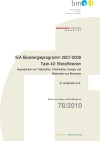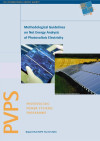Suchergebnisse für "Factsheet: Energietechnologien gestalten, die für alle sinnvoll und nutzbar sind"
IEA SHC SOLARUPDATE Vol.68, December 2018

Das SOLARUPDATE ist der Newsletter des IEA SHC Programme.
Herausgeber: IEA Solar Heating & Cooling Programme
Englisch, 21 Seiten
Downloads zur Publikation
IEA SHC Task 68 Webinar/Youtube 2022: Solar goes Digital: Wie Solarwärme selbstlernende Algorithmen nutzt

Präsentation im Rahmen der Webinar-Reihe Austria Solar Webinar 26.
Unterberger Viktor
Herausgeber: BEST
Deutsch
EBC Annex 66 Text: Definition and Simulation of Occupant Behavior in Buildings

Hintergrund, Ziele und Methoden des EBC Annex 66. (November 2014)
D. Yan, T. Hong
Herausgeber: IEA EBC Annex 66
Englisch, 14 Seiten
Downloads zur Publikation
IEA SHC Task 53: Definition of the existing cooling reference systems (2019)

Dieser umfassende Bericht dokumentiert marktübliche Referenzsysteme im Bereich bis zu 100 kW Kühlleistung. Drei identifizierte Referenzsysteme nehmen am Markt eine dominierende Rolle ein, d.h. Mono-Split-, Multi-Split- und VRF-Systeme (Variable Refrigerant Flow).
T. Selke, Ch. Dipasquale, R. Schex, F. Loistl, C. Heinrich
Herausgeber: SHC Task 53/Report A1, DOI: 10.18777/ieashc-task53-2019-0001
Englisch, 33 Seiten
Downloads zur Publikation
IEA Bioenergy: Österreich Newsletter Mai 2020

In der ersten Ausgabe des IEA Bioenergy Österreich Newsletters werden Highlights aus den österreichischen Beteiligungen an den Tasks des IEA Bioenergy Netzwerkes vorgestellt. Zusätzlich werden ausgewählte Projekte, Veröffentlichungen und Veranstaltungen präsentiert.
Österreichische Taskdelegierte des IEA Bioenergy TCPs
Deutsch, 15 Seiten
Downloads zur Publikation
IEA Bioenergy: Österreich Newsletter Juni 2022

In der fünften Ausgabe des IEA Bioenergy Österreich Newsletters werden Highlights aus den österreichischen Beteiligungen an den Tasks des IEA Bioenergy Netzwerkes vorgestellt. Zusätzliche Informationen betreffen ausgewählte Projekte, Veröffentlichungen und Veranstaltungen.
Herausgeber: Österreichische Taskdelegierte des IEA Bioenergy TCPs, 2022
Mehrsprachig, 16 Seiten
IEA Bioenergy Österreich Newsletter Dezember 2022

In der sechsten Ausgabe des IEA Bioenergy Österreich Newsletters werden Highlights aus den österreichischen Beteiligungen an den Tasks des IEA Bioenergy Netzwerkes vorgestellt. Zusätzliche Informationen betreffen ausgewählte Projekte, Veröffentlichungen und Veranstaltungen.
Herausgeber: Österreichische Taskdelegierte des IEA Bioenergy TCPs, 2022
Mehrsprachig, 14 Seiten
IEA EBC Annex 56: Shining Examples of Cost-Effective Energy and Carbon Emissions Optimization in Building Renovation (2016)

Shining Examples stellen im IEA EBC Annex 56 erfolgreich umgesetzte Demonstrationsprojekte dar, welche in einer umfangreichen Broschüre präsentiert werden.
Ove Christen Mørck, Iben Østergaard, Kirsten Engelund Thomsen, Jørgen Rose, Søren Østergaard Jensen, Manuela Almeida, Marco Ferreira, Nelson Brito, Nuno Baptista, Rui Fragoso, Karl Höfler, Julia Maydl, David Venus, Jiří Sedlák, Karel Struhala, Federica Zagarella, Simone Ferrari, Tiziano dalla Mora, Piercarlo Romagnoni, Henk Kaan, Jon Terés Zubiaga, Åke Blomsterberg, Stéphane Citherlet, Blaise Périsset
Herausgeber: IEA EBC Annex 56
Englisch, 175 Seiten
Downloads zur Publikation
IEA HPT Annex 61: Towards Positive Energy Districts: Innsbruck, “Campagne Areal” (2024)

Conference Proceedings ISEC 2024: Am Beispiel des neuen Stadtteils Innsbruck Campagne werden WP-Integrationsoptionen sowie
Photovoltaik (PV)-Integrationspotenziale im Hinblick auf das Erreichen einer positiven
Energiebilanz bewertet.
Fabian Ochs, Samuel Breuss, Elisa Venturi, Mara Magni, Georgios Dermentzis
Herausgeber: ISEC Graz 2024, AEE INTEC
Englisch
Users TCP: Everyday automation experience: a research agenda (2020)

Im Journal for Personal and Ubiquitous Computing wurde eine Forschungsagenda zum Thema Automation Experience in Smart Homes, Gebäudeautomatisierung und anderen Anwendungsbereichen veröffentlicht.
P. Fröhlich, M. Baldauf, T. Meneweger, M. Tscheligi, B. de Ruyter, F. Paternó
Herausgeber: Personal and Ubiquitous Computing 24 (6), 725-734
Englisch, 9 Seiten
IEA Bioenergy: Österreich Newsletter November 2020

In der zweiten Ausgabe des IEA Bioenergy Österreich Newsletters werden Highlights aus den österreichischen Beteiligungen an den Tasks des IEA Bioenergy Netzwerkes vorgestellt. Neben diesen Highlights werden ausgewählte Projekte, Veröffentlichungen und Veranstaltungen präsentiert.
Österreichische Taskdelegierte des IEA Bioenergy TCPs
Deutsch, 19 Seiten
Downloads zur Publikation
IEA Bioenergy Task 39, Newsletter, Ausgabe 65, June 2024

Der Schwerpunkt dieser Ausgabe liegt auf dem Artikel zum Thema „Biofuels production and development in the United States“.
Tomas Ekbom, Hannah Edgren
Herausgeber: IEA Bioenergy Task 39
Englisch, 16 Seiten
Downloads zur Publikation
IEA Bioenergy: Österreich Newsletter November 2021

In der vierten Ausgabe des IEA Bioenergy Österreich Newsletters werden Highlights aus den österreichischen Beteiligungen an den Tasks des IEA Bioenergy Netzwerkes vorgestellt. Neben diesen Highlights werden ausgewählte Projekte, Veröffentlichungen und Veranstaltungen präsentiert.
Herausgeber: Österreichische Taskdelegierte des IEA Bioenergy TCPs
Deutsch, 17 Seiten
IEA Bioenergy Österreich Newsletter Juli 2024

In der neunten Ausgabe des IEA Bioenergy Österreich Newsletters werden wie gewohnt Highlights aus den österreichischen Beteiligungen an den Tasks des IEA Bioenergy Netzwerkes vorgestellt. Zusätzliche Informationen betreffen ausgewählte Projekte, Veröffentlichungen und Veranstaltungen.
Österreichische Taskdelegierte des IEA Bioenergy TCPs
Herausgeber: IEA Bioenergy TCP (Deutsch/Englisch, 2024)
Mehrsprachig, 14 Seiten
Downloads zur Publikation
IEA Bioenergieprogramm 2007-2009 Task 42 Bioraffinerien

Koproduktion von Treibstoffen, Chemikalien, Energie und Materialien aus Biomasse
Schriftenreihe
78/2010
G. Jungmeier et al.
Herausgeber: BMVIT
Englisch, 111 Seiten
Downloads zur Publikation
Save the Date: 27. - 29. November - SMART CITIES WEEK 2013
Die Tagung widmet sich verschiedensten Aspekten der Smart Cities Thematik. Vorträge zum EU-Rahmenprogramm, der europäischen Smart City Initiativen, Keynotes zu den Herausforderungen der Smart Cities sowie eine Podiumsdiskussion „Klimawandelanpassung im urbanen Kontext“ stehen am Tagungsprogramm.
Neue Publikationen im IEA EBC Annex 61
In den Subtasks des IEA EBC Annex 61 wurden sechs Berichte zum Thema "Deep Energy Retrofit" veröffentlicht.
Bericht der Annexe: Mapping & Benchmarking, Standby Power
Der Bericht der beiden Annexe des Implementing Agreement 4E (Efficiency Electrical End-use Equipment) befasst sich mit der Bewertung und dem Vergleich der Energieeffizienz von elektronischen Geräten und Elektrogeräten in den IEA 4E-Partnerländern.
IEA Wind Annual Report 2014
Der IEA Wind Jahresbericht 2015 ist veröffentlicht und online verfügbar!
Methodological Guidelines on Net Energy Analysis of Photovoltaic Electricity (2016)

Netto-Energie-Analyse ist eine strukturierte umfassende Methode der Quantifizierung des Ausmaßes, in welchem eine Energieerzeugungstechnologie positive Energie-Bilanzen erreichen kann, d.h. nach Abzug des Energieeinsatzes, der zur eigenen Produktion notwendig war. Die neuen Guidelines geben der Anwenderin einen Leitfaden, wie diese Methode anzuwenden ist.
Herausgeber: IEA Photovoltaic Power Systems Programme
Englisch, 35 Seiten
